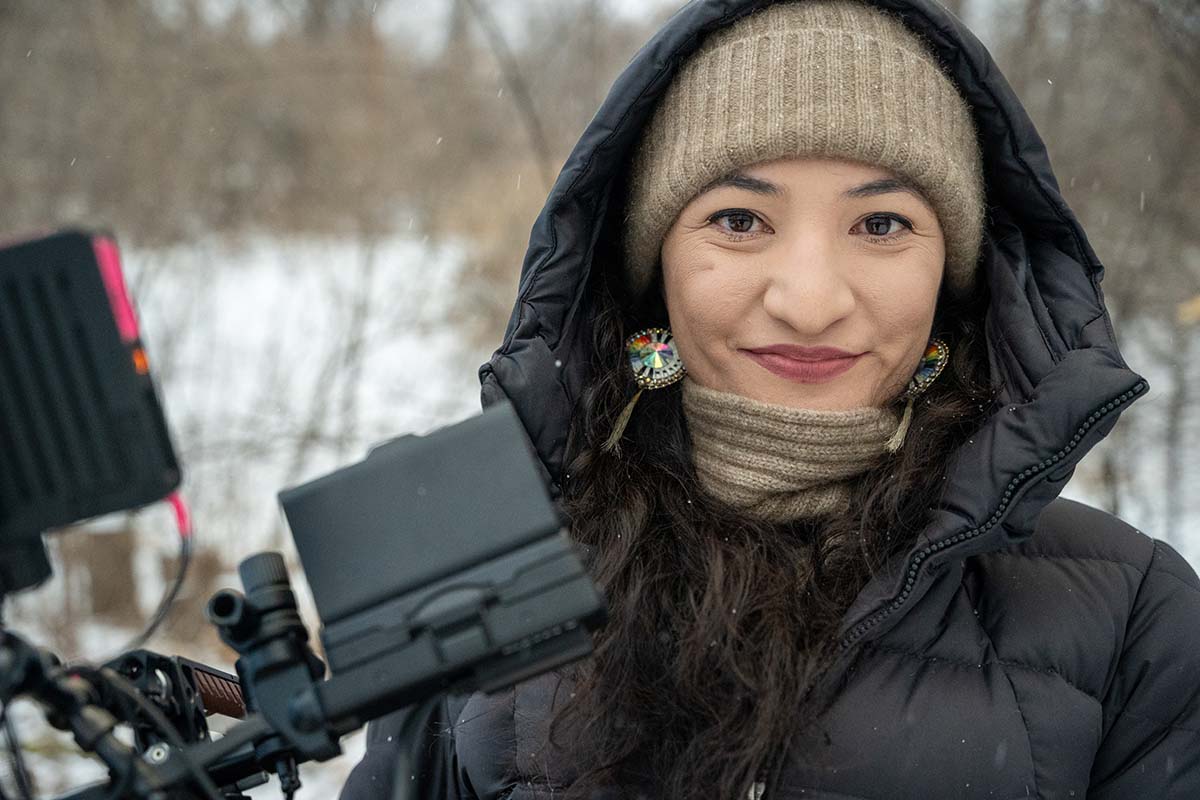IDA Member Spotlight: Tsanavi Spoonhunter

Tsanavi Spoonhunter was born and raised in Payahuunadü—the homelands of her Paiute people in central California—and is a proud citizen of the Northern Arapaho Tribe. Her ancestry and upbringing in Indian Country have strongly informed her storytelling and artistic vision. Spoonhunter’s short films have screened on Alaska Airlines, at the National Museum of the American Indian, The Redford Center, art museums and PBS affiliates. She serves as director and producer on her first feature-length film titled Holder of the Sky (2023). The film has received support from SFFilm, IDA’s Enterprise Documentary Fund, the Center for Independent Documentary, and the Logan Nonfiction Program. Spoonhunter holds a Master of Journalism degree from the University of California, Berkeley Graduate School of Journalism. She is a 2022 SFFilm FilmHouse Resident and First Peoples Fund Fellow.
IDA: Tell us about yourself: What is your profession (or passion), and what are some of the notable projects you’ve worked on?
TSANAVI SPOONHUNTER: I’m a freelance journalist and independent nonfiction filmmaker. The most notable project that I’ve directed is my short film, Crow Country: Our Right to Food Sovereignty, which covers a topic that I’m extremely passionate about: storytelling that focuses on Indigenous communities. Growing up as a member of this community, I was often stereotyped because of the “poverty porn” media coverage and inaccurate film depictions that primed people’s perspectives of me. As a result of my upbringing, I feel a certain responsibility to create films that give balance to the beauty of a place and its people, but also reveal the realities of tribal sovereignty in a contemporary context. It’s also been an incredible stepping stone for me to assist with reshaping the Indigenous film narrative in the nonfiction industry.
IDA: Was there any particular project you’ve worked on that helped shape the trajectory of your career?
TS: The project that has really started shaping my filmmaking trajectory is my first feature-length film, Holder of the Sky. It’s a story about Wisconsin tribes reclaiming the historic treaty promises made to them, in the face of racism and lingering land lust. It received support from the IDA Enterprise Documentary Fund in 2020. When it was awarded funding, we were in the research and development stage and now we’re in production. Over the past two years I’ve learned so much about the early phases of the filmmaking process, and it makes me eager to learn each stage of a film’s completion. I’m also learning about myself and constantly thinking about how my decisions will impact the story, because in the end it’s not about me but about the individual stories I’m privileged enough to capture.
IDA: What is the inspiration behind creating Holder of the Sky?
TS: I grew up on a small reservation in Central California, a beautiful landscape nestled against the towering Sierra Nevada mountain range, known among my people as the “place of flowing water.” My hometown bordered several white communities, and for that reason I was intrigued when the Oneida Nation of Wisconsin’s vice president reached out to me regarding ongoing conflicts between them and a neighboring white village. This “insider” experience has motivated me to pursue this story because I understand the implications of a conflict like this, for both communities involved. I later found that other tribes in the state face similar battles: each wants to maintain the land and resources they've been left to steward. It’s such a simple concept but oftentimes misunderstood, and something that should be honored, but isn’t.
IDA: What has the experience of being an IDA Member and an IDA Enterprise Documentary Fund grantee been like for you?
TS: The IDA Enterprise Documentary Fund has really been transformational for Holder of the Sky. With the financial support, we’ve been able to create all the necessary assets to continue seeking support for each phase of the film. I couldn’t thank the team that was led by Poh Si Teng enough. Since then, I’ve maintained my connection with those who supported the film and it’s truly been a wonderful experience. I’m so grateful for it. I also appreciate IDA’s membership because I’m able to fully take advantage of its benefits. I’d say that the magazine is one of my favorites because of the rich insights I gain from respected nonfiction filmmakers. It’s nice to absorb the advice penned by them because they write about pressing issues in the industry today.